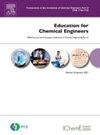A bibliometric analysis of game-based learning applications in chemical engineering education: Key elements and evolution
IF 2.3
2区 教育学
Q1 EDUCATION, SCIENTIFIC DISCIPLINES
引用次数: 0
Abstract
In recent years, the incorporation of game-based learning (GBL) methodologies into undergraduate and graduate engineering programs has gained notable attention. These innovative approaches are increasingly recognized for their positive impact on student skills and academic achievement. GBL has been used to explore various facets of engineering education. However, there remains a gap in understanding its specific applications within chemical engineering programs. This study attempts to fill this gap by conducting a comprehensive bibliometric analysis of the key elements and evolutionary trends of GBL in chemical engineering education. Our analysis delves into the contributions of prominent authors and leading academic institutions that have actively shaped the field, as well as identifying the main strategies used by authors. A carefully constructed query equation was used to identify and analyze 74 relevant documents, ensuring the inclusion of the most impactful research. The results of this study provide a valuable foundation for further exploration and innovation in using GBL to advance chemical engineering education and support new and future research in the field by highlighting significant trends and key contributors.
基于博弈的学习在化学工程教育中的应用:关键要素与演变
近年来,将基于游戏的学习(GBL)方法整合到本科和研究生工程课程中获得了显著的关注。这些创新的方法因其对学生技能和学业成绩的积极影响而日益得到认可。GBL已被用于探索工程教育的各个方面。然而,在了解其在化学工程项目中的具体应用方面仍然存在差距。本研究试图通过对化学工程教育中GBL的关键要素及其演变趋势进行全面的文献计量分析来填补这一空白。我们的分析深入研究了积极塑造该领域的杰出作者和领先学术机构的贡献,并确定了作者使用的主要策略。使用一个精心构建的查询方程来识别和分析74个相关文件,确保纳入最具影响力的研究。本研究的结果为进一步探索和创新利用GBL来推进化学工程教育,并通过突出重要趋势和关键贡献者来支持该领域新的和未来的研究提供了有价值的基础。
本文章由计算机程序翻译,如有差异,请以英文原文为准。
求助全文
约1分钟内获得全文
求助全文
来源期刊

Education for Chemical Engineers
Multiple-
CiteScore
8.80
自引率
17.90%
发文量
30
审稿时长
31 days
期刊介绍:
Education for Chemical Engineers was launched in 2006 with a remit to publisheducation research papers, resource reviews and teaching and learning notes. ECE is targeted at chemical engineering academics and educators, discussing the ongoingchanges and development in chemical engineering education. This international title publishes papers from around the world, creating a global network of chemical engineering academics. Papers demonstrating how educational research results can be applied to chemical engineering education are particularly welcome, as are the accounts of research work that brings new perspectives to established principles, highlighting unsolved problems or indicating direction for future research relevant to chemical engineering education. Core topic areas: -Assessment- Accreditation- Curriculum development and transformation- Design- Diversity- Distance education-- E-learning Entrepreneurship programs- Industry-academic linkages- Benchmarking- Lifelong learning- Multidisciplinary programs- Outreach from kindergarten to high school programs- Student recruitment and retention and transition programs- New technology- Problem-based learning- Social responsibility and professionalism- Teamwork- Web-based learning
 求助内容:
求助内容: 应助结果提醒方式:
应助结果提醒方式:


